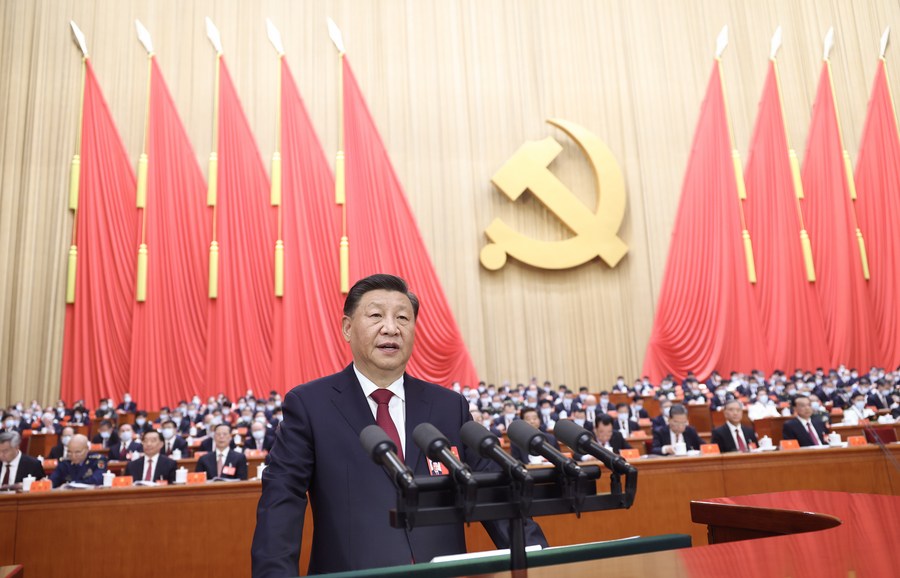Xi Jinping leads China on new journey


For a strong China
Xi inherited a mission to achieve China's modernity, which had been dreamed of and fought for by generations of Chinese people.
In 2020, he paused before an exhibit at a museum in Guangdong Province displaying a grand plan Sun Yat-sen designed to modernize China a century ago. Sun successfully led the Revolution of 1911 to end China's last imperial dynasty and founded a republic. But it did not last. The grand plan failed to materialize. "Only we Chinese Communists can make it happen," Xi said before the exhibit.
According to Xi, all the endeavors the Party led the nation in pursuing over the century are to turn China into a great modern country and realize the Chinese Dream of national rejuvenation.
Ten years ago, when Xi ascended to the Party's top post, China was already the world's second-largest economy and top manufacturer. But the economy faced increasing downward pressure and the need for transforming the economic structure was pressing. Other tough issues also needed to be resolved, such as corruption, pollution and the rich-poor income gap, all posing grave challenges to the Party.
All eyes were on Xi. People expected him to bring real changes. And changes must begin from the Party itself. Xi said it takes a good blacksmith to forge good steel, calling for the self-reform of the Party and "full and rigorous" self-governance. He unleashed the largest anti-corruption campaign in the Party's history. "We must do the things that need to be done ... If we let a few hundred corrupt officials slip through the cracks, we would let down all 1.3 billion Chinese people," Xi said.
In the past decade, the fallen crooked officials included the "tigers" such as Zhou Yongkang, Bo Xilai, Guo Boxiong, Xu Caihou, Sun Zhengcai, and Ling Jihua, as well as many top officials of central government departments, state-owned companies, and provinces. There were also numerous cadres in much lower positions in the governance hierarchy.
In early 2022, Xi declared that an overwhelming victory had been achieved in the fight against corruption, and the victory has been consolidated across the board. But he warned Party cadres that they must be sober-minded and be aware that the anti-corruption campaign will never end.
Xi wants to ensure that the CPC's over 96 million members and 4.9 million primary-level organizations maintain their purity and strength. Xi considers the Party's overall leadership the key to building China into a great modern socialist country. The Party must "be the strong backbone that the Chinese people can lean on at all times," he said.
He repeatedly told Party cadres to learn from the collapse of the Soviet Union and reiterated the importance of having firm convictions in communism and strengthening Party discipline. Xi led the formulation of the game-changing eight-point decision on improving work conduct. He ordered leading officials to regularly report their personal and family matters such as marriage status, personal finances and business involvement. The Party regulated the business involvement of the spouses, children and children's spouses of over 4,700 officials between 2015 and 2021.
Xi led the efforts to promulgate and revise a series of Party regulations, improve the mechanism to conduct discipline inspections, and establish the National Commission of Supervision that places everyone in public office under oversight.
Observers said Xi has played a key role in reshaping the CPC. Liu Jingbei, a professor at the China Executive Leadership Academy in Pudong, said Xi further strengthened the unity in thinking, political orientation and action of Party members. He reversed the trend that the Party's leadership was being weakened and marginalized in some localities and departments.
Xi called on the public to respect and learn from heroes. A national law on respecting heroes was promulgated. A sound system of granting awards and honors was set up. Xi also put forward a set of core socialist values, the essence of which, he said, is patriotism.
Xi has fostered the concept of "whole-process people's democracy," calling for greater efforts to develop socialist democracy. He said democracy is an instrument for addressing the issues that concern the people. If the people are only awakened at election time but go into hibernation afterward, then this kind of democracy is a mere formality.
The law-based governance in all fields Xi advances is considered a profound revolution in governance. The rule of law for the country, the government, and society must be comprehensively in place by 2035, according to Xi. He is the first Chinese president to swear allegiance before the country's Constitution. Xi said the Constitution enjoys supreme legal status, authority and force.
In the past decade, China's national legislature adopted 70 laws and revised 238 laws. Many of the legislations are groundbreaking, including the Civil Code adopted in 2020 and the Foreign Investment Law adopted in 2019, which is the basic law governing foreign direct investment in the country promoting the high-level liberalization and facilitation of foreign investment.
These efforts have helped create more favorable conditions for development. Xi raised the notion of economic "new normal." He said China's reform has entered deep water.
He personally chairs a number of central commissions to strengthen the Party's leadership over economic work as well as reform and opening up. He led the efforts to streamline government and reduce taxes and fees for enterprises.
Since the third plenum of the 18th CPC Central Committee in 2013, more than 2,000 reform plans have been implemented, covering almost every aspect of economic, political, social and cultural undertakings as well as people's everyday life.
Xi has put forward a new development philosophy that promotes innovative, coordinated, green, open and inclusive development for all. Peter Koenig, a former senior economist at the World Bank, said the new development philosophy is probably the core of what has been named "Xiconomics." "This is very typical and I think it well describes what is happening now in the Chinese economy," he said.
























